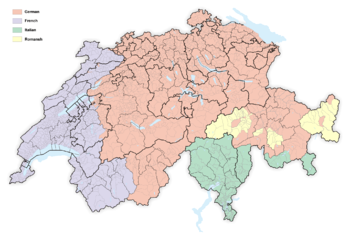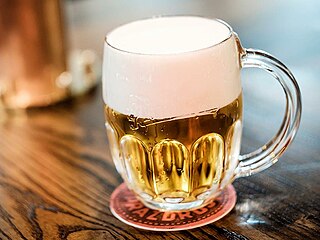
Pilsner is a type of pale lager. It takes its name from the Bohemian city of Plzeň, where the world's first pale lager was produced in 1842 by Pilsner Urquell Brewery.

Kölsch is a style of beer originating in Cologne (Köln), Germany. It has an original gravity between 11 and 14 degrees Plato. In appearance, it is bright and clear with a straw-yellow hue.

Holsten Brewery is a brewing company founded in 1879 in what is now Hamburg's Altona-Nord quarter. The group now has seven breweries in Germany. Its nationally distributed premium brand is the pale lager Holsten Pilsener. The company was acquired by the Carlsberg Group in 2004.
Kronenbourg Brewery is a brewery founded in 1664 by Geronimus Hatt in the Free Imperial City of Straßburg, Holy Roman Empire. The name comes from the area where the brewery relocated in 1850. The company is owned by the Danish multinational Carlsberg. The premium brand is Kronenbourg 1664, a 5% abv pale lager.

Beer in Belgium includes pale ales, lambics, Flemish red ales, sour brown ales, strong ales and stouts. In 2018, there were 304 breweries in Belgium, including international companies, such as AB InBev, and traditional breweries, such as Trappist monasteries. On average, Belgians drink 68 litres of beer each year, down from around 200 each year in 1900. Most beers are bought or served in bottles, rather than cans, and almost every beer has its own branded, sometimes uniquely shaped, glass. In 2016, UNESCO inscribed Belgian beer culture on their list of the intangible cultural heritage of humanity.

Hürlimann Brewery is a former brewery in Zürich, Switzerland, now owned by the Rheinfelden, Aargau based brewery Feldschlösschen, which is owned by Carlsberg.
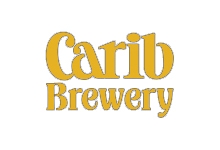
The Carib Brewery Limited is headquartered in Trinidad and Tobago. It produces Carib and Stag beers and a range of shandy products. The main brewery is located in Champs Fleurs, Trinidad, while Carib also has breweries in Saint Kitts and Nevis and Grenada, as well as a United States affiliate brewery in Cape Canaveral, Florida.
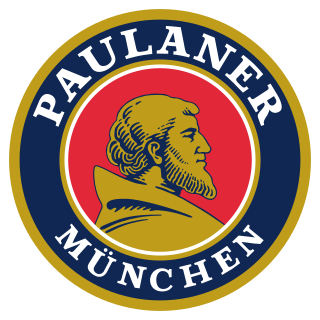
Paulaner is a German brewery, established in 1634 in Munich by the Paulaner Order of mendicant friars. Now owned by the Schörghuber family, it is one of the six breweries which provides beer for Oktoberfest. Paulaner ranks number six among Germany's best-selling beers.

Feldschlösschen is a Swiss beverage and brewing company located in Rheinfelden, in the German-speaking canton of Aargau, Switzerland.

Karlsberg is one of the largest breweries in Germany; the Karlsberg Group also owns various other beer brands. It is called Karlsbräu outside of Germany to differentiate it from the Danish brewing company Carlsberg.
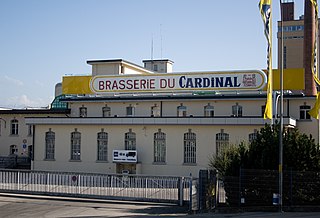
Cardinal is a Swiss brand of beer and a former brewery founded in 1788 by François Piller, located in Fribourg. The brewery was acquired by Feldschlösschen in 1991, which itself was acquired by the Carlsberg Group in 2000.
Quebec beer is the beer brewed in Quebec, Canada, often with ingredients from Quebec itself and generally following the recipes of the French, Belgian and British brewing traditions. Generally, the beers brewed in Quebec differ from those in the rest of North America because of the relative importance of the French and Belgian traditions alongside that of Great Britain. German-type beers are also produced by some breweries.
Heineken N.V. is a Dutch brewer which owns a worldwide portfolio of over 170 beer brands, mainly pale lager, though some other beer styles are produced. The two largest brands are Heineken and Tecate; though the portfolio includes Amstel, Fosters, Sagres, Cruzcampo, Skopsko, Affligem, Żywiec, Starobrno, Zagorka, Zlatý Bažant, Laško and Birra Moretti.
The Brewers of Europe is a Brussels-based organisation representing national brewers' associations to the European Union. It was founded in 1958 as the "Communauté du travail des Brasseurs du Marché Commun – C.B.M.C." before becoming "Brewers of Europe" in 2001. The organisation represents the interests of more than 10,000 breweries in 29 European countries, employing more than 200,000 people and producing around 40 billion litres of beer per year. It aims to promote and protect the European brewing industry, working with policy makers and stakeholders to create a favourable regulatory environment for European brewers. The Brewers of Europe is also committed to promoting responsible beer consumption and environmental sustainability in the brewing industry. They have developed initiatives such as “BeerWisdom” which aims to encourage responsible beer consumption, “Proud to be clear” which calls the brewers to be transparent on labelling ingredients and the "Brewers Forum" which brings together European brewers to discuss key industry issues such as environmental sustainability, innovation and consumer trends. The Brewers of Europe is led by a president elected by the members of the organization for a three-year term. The current president is Lasse Aho. The organization is also supported by a Secretary General based in Brussels, which provides advice and support to the organization’s members.

Most beer sold in France is pilsner lager, mass-produced by major breweries which control over 90% of the market, although there are also traditional beer styles, such as top-fermented Bière de Garde, and a number of microbreweries.

Fucking Hell is a German pale lager, a Pilsner, with an alcohol content of 4.9%. It is named after Fucking, the previous name of the village of Fugging in Austria; hell is the German word for 'pale' and a typical description of this kind of beer. The beer's name was initially controversial. Both the local authorities in Fucking and the European Union's Trade Marks and Designs Registration Office initially objected to the name. It was eventually accepted and the lager is sold internationally.
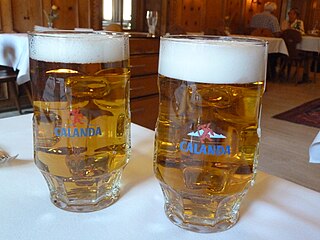
Calanda Bräu is a brewery in Chur, in the Canton of Graubünden, Switzerland, owned by Heineken N.V. Its lagers, brewed using Alpine spring water, are available across Switzerland.

Luxembourg has a long tradition of beer brewing, dating back to at least 1300. Although there used to be more than 12 local breweries in Luxembourg in the early 1950s, this number has come down to only three big breweries remaining in the early 2010s. The three big breweries still active today are: Brasserie Nationale, producing Bofferding and Battin, Brasserie de Luxembourg, producing Diekirch and Mousel, and Brasserie Simon, producing Simon and Ourdaller.

Brasserie Battin, is a Luxembourgish brewery founded by Charles Battin in 1937 in the city of Esch-Alzette. Since 2004 Brasserie Nationale owns Brasserie Battin; since 2005 the beer brand Battin is brewed in Bascharage.

Beer in Egypt has long held a significant role, and its presence in the country is thought to date back to the Predynastic period. In ancient Egypt wine was preferred by the upper class, whereas beer was a staple for working class Egyptians and a central part of their diet. Despite religious restrictions and conflicting views on alcohol after the Muslim conquest of Egypt, the consumption of beer did not cease, and it still remains the most popular alcoholic beverage in the country by far, accounting for 54 percent of all alcohol consumption.


